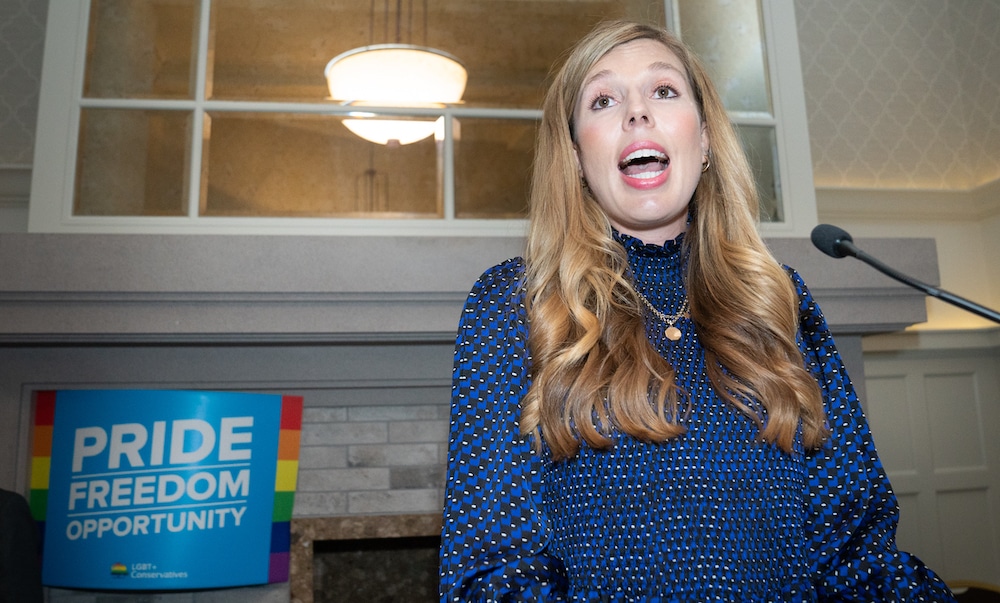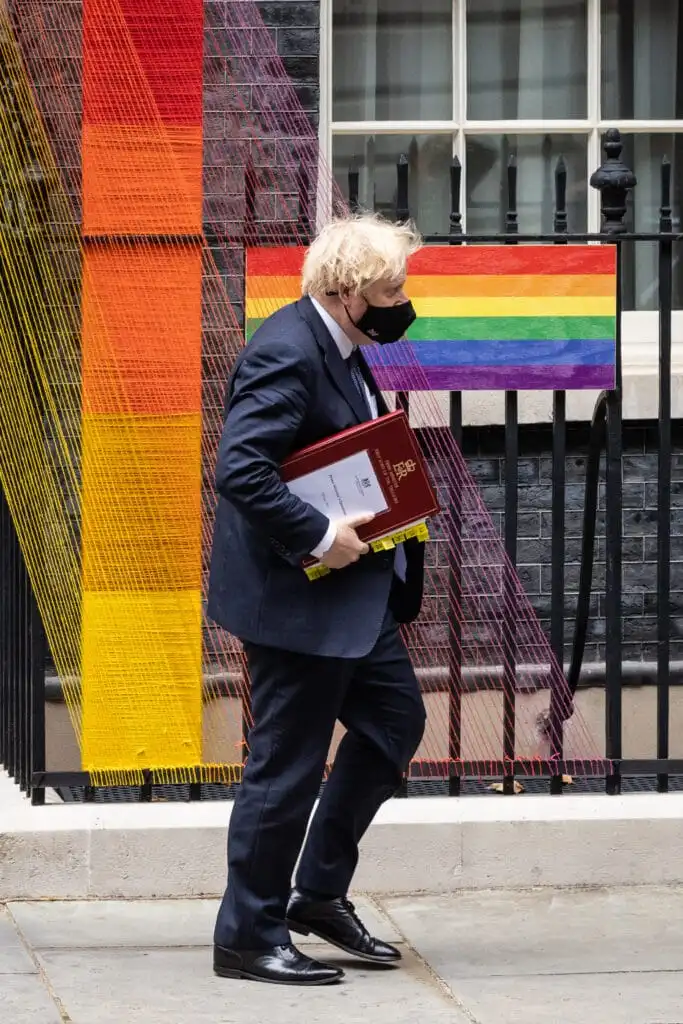The Tories and LGBT+ rights: The good, the bad and the very, very ugly of the last decade

Boris Johnson speaking at the Conservative party on 6 October 2021 (Ian Forsyth/Getty)
Boris Johnson speaking at the Conservative party on 6 October 2021 (Ian Forsyth/Getty)
Carrie Johnson’s self-assured speech at the Conservative Party Conference painted a pretty picture of the Tories’ LGBT+ record, but the reality is a lot more problematic.
The prime minister’s wife took to the podium on Tuesday (5 October) to praise Boris Johnson’s commitment to the LGBT+ community.
She highlighted his votes to repeal Section 28, pass same-sex marriage and lift the ban on foreign embassies flying the Pride flag – but conveniently skipped past her husband’s use of homophobic slurs, including the phrase “tank-topped bum boys”, which he has repeatedly refused to apologise for.
And that wasn’t the only thing Carrie Johnson glossed over. While it’s true that the Conservatives have made several LGBT+ gains, most notably the passage of marriage equality in 2013, there’s also a lot to be ashamed of.

Carrie Johnson, wife of Prime Minister Boris Johnson, speaks at the LGBT+ Pride reception at the Conservative Party Conference. (Getty/ Stefan Rousseau-Pool)
PinkNews takes a look at the Conservatives’ good, bad and ugly impact on LGBT+ rights since David Cameron’s time as prime minister, starting with the positives.
Marriage equality
Undeniably the Conservatives’ biggest LGBT+ victory was the passing of same-sex marriage in 2013. It was a landmark moment in British history and the culmination of years of tireless activism from LGBT+ people across the UK.
Much is made of the fact that David Cameron, a Conservative prime minister, was the one to champion marriage equality and pass the legislation. His support was indeed critical, but little credit is given to the Lib Dems’ Lynne Featherstone, the originator and architect of the law.
She launched the same-sex marriage consultation and was the first politician to take part in PinkNews‘ Out4Marriage campaign while many others continued to drag their feet.
When the vote finally came the Lib Dem coalition was instrumental to passing the law, as a total of 136 Conservatives fiercely opposed it. Anti-LGBT+ Tories made up more than 77 per cent of the total opposition, and nearly half of the party.
Pardons for those convicted of gay sex offences
In February this year the Ministry of Defence introduced the Armed Forces Bill 2021, which automatically pardons those within the UK military who were convicted of historic gay sex offences. This finally fixed centuries-old legislation that was used to criminalise queer men, destroying the lives and livelihoods of hundreds.
It was also announced that military personnel dismissed on grounds of homosexuality will be able to have their service medals restored if they had been taken away.
Although the Policing and Crime Act 2017 granted similar posthumous pardons to some armed forces personnel, it did not apply to historical offences relating to the Army and Royal Marines prior to 1881.

Alan Turing took his own life after being convicted of gay sex offences. (Getty)
Commonly known as Turing’s Law, the 2017 Act gave automatic pardons to deceased men convicted of since-abolished sexual offences.
Those who are still living and who were convicted of historical gay sex offences are able to apply for a formal pardon if the Home Office agrees they committed no crime (there was already a disregard process in place to clear convictions).
However, two years after the law passed, it was reported that fewer than 200 people had received pardons.
LGBT-inclusive sex education
Another big win was the introduction of compulsory LGBT-inclusive sex and relationships education. As of September 2020 the Conservative government requires all schools to teach the protected characteristics of the Equality Act 2010 as they apply to relationships.
This means that every primary school child must learn about different types of families, including those with same-sex parents, and secondary school students must be taught about sexual orientation and gender identity.
Education secretary Gavin Williamson remained firm on the new curriculum despite strong pushback from religious parents. If implemented correctly it will go a long way to addressing some of the damage left by Section 28.
Easing blood donation restrictions
Earlier this year the Conservatives eased blood donation rules for gay, bisexual and queer men, ending a controversial policy that required them to remain celibate for at least 12 months.
This deferral period has now been removed entirely for men who’ve had the same partner for three months or more. Anybody who has had anal sex with new or multiple partners in those three months cannot donate, effectively ruling out many queer men.
LGBT+ advocates have long pointed out that any deferral period for gay and bisexual men is unnecessary, discriminatory and rooted in outdated guidelines from the HIV epidemic.

Sajid Javid delivers his keynote speech during the Conservative party conference on 5 October 2021 (Ian Forsyth/Getty)
The Conservatives’ ugly LGBT+ milestones… Rise in anti-LGBT+ hate crimes
Reports of homophobic abuse in the UK have been skyrocketing during the Conservatives’ time in power, increasing from 5,807 in 2014–15 to 13,530 in 2018–19.
By 2020 overall hate crime levels had topped 100,000 for the first time ever, the highest number since records began in 2011/12 according to Home Office figures. The biggest proportionate rise was seen in transphobic hate crimes, which soared by 16 per cent to 2,540.
There was a similar rise in homophobic hate offences which jumped by 19 per cent to 15,835. When viewed over a five-year period the numbers are even more shocking: transphobic offences are shown to have quadrupled between 2014-15 and 2019-20, representing a 354 per cent increase.
Tragically, only one in three LGBT+ hate crime victims are able to access the support they need afterwards, according to the LGBT+ anti-abuse charity Galop.
Police have suggested that the spike in hate crimes could be down to an increase in reporting and awareness. But Stonewall chief executive Nancy Kelley says these figures are only “the tip of the iceberg,” as the vast majority of cases go unreported.
Abysmal LGBT+ asylum
The UK Home Office is reported to be notoriously inhospitable to LGBT+ asylum seekers, whose claims are refused at a higher rate than the national average (recent figures show 54 per cent of LGB asylum claims were denied in 2019, compared to 48 per cent of other cases).
Campaigners have long complained this is down to Home Office’s “culture of disbelief”, with queer claimants being made to feel like “criminals” when seeking refuge.
Many stories have emerged of asylum seekers being expected to meet derogatory stereotypes to “prove” their sexuality, including one man who was rejected as he did not have a gay “demeanour” and did not “look around the room in an effeminate manner”.
Stonewall research has also found that LGBT+ asylum seekers are particularly vulnerable in immigration detention and face significant disadvantages and dangers, including discrimination, harassment and violence from other detainees and staff.
This harrowing detention environment has been found to have serious long-term effects on their mental and physical well-being.

Home Secretary Priti Patel (Peter Summers/Getty Images)
Scrapping reforms to the Gender Recognition Act
Crucial reforms to the Gender Recognition Act – the bedrock of trans rights in the UK – have been consistently delayed by the Conservatives before being dropped altogether this year.
To obtain a Gender Recognition Certificate trans people must first get a diagnosis of gender dysphoria, which can take years due to the painfully-long waiting times at NHS gender clinics. They must also have medical reports submitted to a panel, whom the applicant will never meet, to judge whether they meet the criteria for legal recognition.
The process has been widely condemned as intrusive, intimidating and undignified, and a public consultation found overwhelming support for reform – yet these plans were abandoned in favour of minor administrative changes, such as moving the process online and reducing the cost.
“What we know, and what we hear from our supporters, is that the system is still fundamentally broken,” said the trans advocacy organisation TransActual.
“Most of the barriers to applying remain: not least the cost of amassing evidence. Moving the application process online will do nothing, on its own, to reduce the uncertainties surrounding that process. Indeed, if it is moved wholly online, then the net effect of this change could make it even harder for some trans people to apply for a GRC.”
Rise in anti-trans rhetoric
The Conservatives’ inaction following the GRA consultation has been cited as a driving force for the rising transphobia in the UK, which has grown so severe that the country was singled out in a recent Council of Europe report on anti-LGBT+ hatred.
The report dedicates an entire, shameful section to the UK’s rise in anti-trans rhetoric, naming the UK alongside Hungary, Poland, Turkey and Russia for its “marked increase” in anti-LGBT+ hate speech.
It highlights the government’s opposition to the self-identification of trans people, as stated by Kemi Badenoch at the IDAHOT Forum 2021, which “contradicts international human rights standards with respect to the rights of trans people”.
“Such rhetoric – which denies trans identities – is being used to roll back the rights of trans and non-binary people and is contributing to growing human rights problems,” the report says.

Foreign Secretary and Minister for Women and Equalities Liz Truss at the Conservative Party Conference. (AFP via Getty/ OLI SCARFF)
Still no conversion therapy ban
Campaigners have heavily criticised the Conservatives for “dragging their feet” on the matter of conversion therapy, which remains legal in the UK over three years after the government pledged to ban the practice in the 2018 LGBT Action Plan.
The traumatising practice has been discredited by every major psychiatric body and the Tories have repeatedly stated their intention to stamp it out – but the LGBT+ community is still waiting for action.
“Delay only emboldens the perpetrators and continues to cause life long trauma to their victims. The government keeps assuring us that they are ‘working at pace’ on this matter, but one has to question whose pace?” asked Jayne Ozanne, a survivor of conversion therapy.
The government’s latest excuse is that legislation can only be advanced following a public consultation process which will ensure a ban will “protect the medical profession, defend freedom of speech, and uphold religious freedom”. The consultation has been pushed back by weeks, with a late October launch slated by officials.
After sustained pressure from LGBT+ charities, advocates and celebrities the government agreed earlier this month to bring the ban forward to spring 2022, more than three and a half years after it was first promised.
Ignoring legal recognition for non-binary people
Non-binary people are still unable to gain legal recognition in the UK, and the Conservatives have continued to ignore the growing demand despite a petition amassing over 140,000 signatures.
The Cabinet Office quashed hope in May this year as it announced that legally recognising non-binary gender identities would have “complex practical consequences” and Boris Johnson’s government has “no plans” to do so.
This puts the UK behind Belgium, Germany, Iceland, Malta, most Australian territories, India, Nepal, Pakistan and Uruguay, which all legally recognise non-binary genders.
Countries including Denmark and New Zealand, several US states and Canadian territories all offer ‘X’ gender options on legal documents for non-binary citizens.

LONDON, ENGLAND – JUNE 30: Britain’s Prime Minister Boris Johnson walks beneath the Pride Month installation outside number 10, as he heads to the weekly PMQ session in the House of Commons, at Downing Street on June 30, 2021 in London, England. (Photo by Leon Neal/Getty Images)
Supporting so-called ‘gender critical’ feminists
The government’s choice of chairwoman for its Equalities and Human Rights Commission, Kishwer Falconer, did not go unnoticed by trans advocates.
The head of Britain’s equalities watchdog has suggested it is “entirely reasonable” to question trans people’s gender identity and believes cis women should have the right to express “gender critical” views without being “abused”.
The government commission put these views into practice when it controversially intervened in the high-profile case of Maya Forstater, who sought to convince an employment tribunal that her refusal to accept that trans women are women should be a protected “philosophical belief”.
The commission backed Forstater’s appeal, arguing that the judge incorrectly interpreted the law that should have protected her right to freedom of belief and speech.
A judge went on to rule that Forstater’s “gender critical” views are protected under equalities law, though misgendering trans people remains unlawful.
Falling short on HIV
More than 1,000 days after committing to ending the UK’s HIV epidemic by 2030, the government has yet to “turn these words into action”, according to 35 major HIV charities, LGBT+ groups and health bodies.
In 2019 the government said its work to end new transmissions would be supported by £600,000 from Public Health England’s HIV Prevention Innovation Fund. This money was earmarked for “13 innovative UK schemes” to help reduce the risk of people getting the virus and reduce stigma.
But more than two years later the HIV Action Plan still has not been fully funded, the leading charities say, forcing them to shoulder the burden of the 80 people a week who are still diagnosed with HIV in the UK.
“Now the government needs to play its part,” they urged Rishi Sunak this month.

